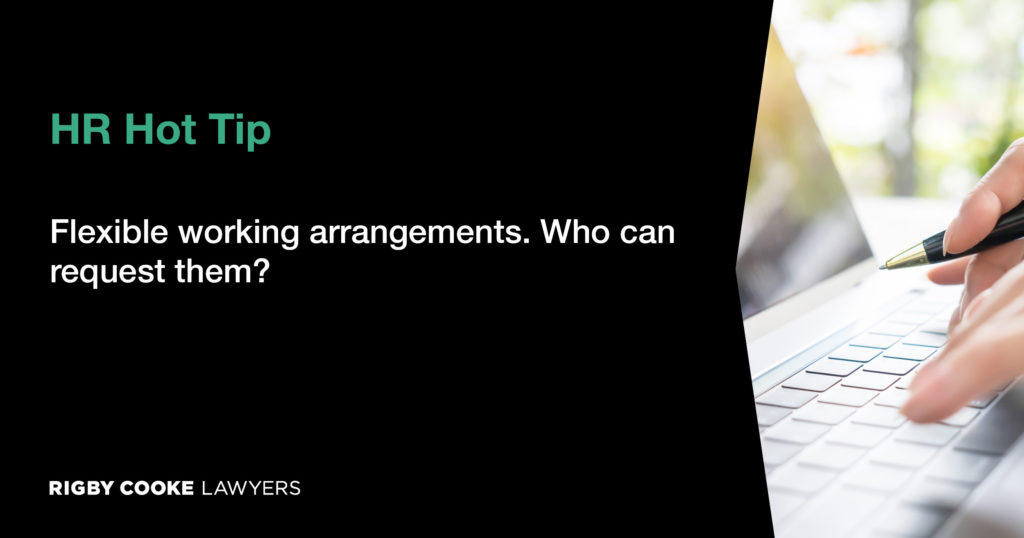Welcome to our series of HR interviews with Associate Stephanie Shahine, who answers some of the most common questions asked by HR managers regarding employees’ legal entitlements and employers’ health and safety requirements, especially as business begins to transition back into the office.

As employers look to transition their employees back to the workplace, many may find their employees looking for increased flexible working conditions. As an employer, it is important to be aware of what an employee can request and your rights as an employer.
The National Employment Standards (NES) under the Fair Work Act 2009 (Cth) include a mechanism to seek a flexible working arrangement which can include continuing to work from home. The NES specifies that an employee (other than a short-term casual employee) who have worked with the same employer for at least 12 months can apply for a flexible work arrangement in the following circumstances:
-
- the employee is the parent, or has responsibility for the care, of a child who is of school age or younger;
- the employee is a carer (within the meaning of the Carer Recognition Act 2010);
- the employee has a disability;
- the employee is 55 or older;
- the employee is experiencing violence from a member of the employee’s family;
- the employee provides care or support to a member of the employee’s immediate family, or a member of the employee’s household, who requires care or support because the member is experiencing violence from the member’s family.
The NES does not provide a mechanism for an employee to challenge a refusal of a request for an individual flexible working arrangement (IFA). However, many Enterprise Agreements and Modern Awards include this right to request flexible working arrangements. If a dispute should arise with respect to this request, the employee may access the Dispute Resolution mechanisms under the Enterprise Agreement or Modern Award and make an application to the Fair Work Commission under the Dispute Resolution clause.
If an IFA is entered into, it is effectively a written agreement used by the employer and employee to alter the effect of certain clauses in their award or agreement and is used to set alternative arrangements that suit both the needs of the employer and employee.
An IFA cannot be used to remove or reduce any of the employee’s legal entitlements1. The Fair Work Act 2009 (FW Act) provides guidelines for employers regarding different groups of employees and their rights to request a change in their working arrangements including hours, patterns and locations of work2. Some State and Territory laws deal with flexible working arrangements and confer greater rights on employees. For example, in Victoria, the Equal Opportunity Act 2010 (EO ACT) imposes an obligation on employers to eliminate unlawful discrimination and to make reasonable adjustments to accommodate a worker’s disabilities or obligations as a parent or carer. Consequently, an instruction to return to the workplace that does not comply with the EO Act obligations would not be lawful or reasonable.
Therefore, if any disciplinary action is commenced against an employee who refuses or fails to comply with an instruction to return to the workplace, then the employee’s personal circumstances should be carefully considered.
How is an IFA made?
An IFA can be made at any point in time after the employee has commenced work with their employer. If the employee is covered by an Award or an Enterprise Agreement there will be a clause which outlines how a request can be made and the grounds on which a request can be rejected.
It is important that both the employer and employee agree to the IFA. The employee cannot be forced to sign an IFA to gain employment and an employer has a right to refuse to agree to an IFA given that they have a reasonable reason to do so.
Both parties can request the IFA and when finalised must be put in writing and signed by both parties. The employer must keep the agreement on file and provide a copy to the employee for their records.
An employer does not need to have the IFA registered or approved by either the Fair Work Ombudsman or the Fair Work Commission.
How is an IFA ended?
An IFA can be concluded at any time by a written agreement between both the employer and employee. The IFA can also be ended by one party, provided they provide the other with appropriate notice. If the IFA was made under an Award, it can be ended with 13 weeks’ notice, while a registered agreement will outline how much notice is required.
An IFA can be terminated for a number of reasons, it may be the case that the IFA is no longer suitable for the needs of the business or the IFA may no longer be required by the employee.
As the world continues to change around us as a result of COVID-19, it is a timely reminder that employers can provide employees with support and options where appropriate to facilitate a better working environment.
Employers need to familiarise themselves with and understand their legal obligations to avoid any possible claims by employees (both existing and former), as well as prosecution by the Fair Work Ombudsman or Safe Work Australia.
As an employer, it is your obligation to provide a safe and risk free working environment for all employees, as far as is reasonably practicable, both in the workplace and while they are working from home. Employers should ensure they are adhering to the Fair Work Act 2009 (Cth) and the Occupational Health and Safety Regulations 2017, to fulfill their obligations.
A HR Legal Audit conducted by Rigby Cooke’s Workplace Relations team can provide the HR function and, in turn, provide employers with comfort in knowing that they are legally compliant, or at least provide advance warning of any potential compliancy issues before they become problematic.
1. https://www.fairwork.gov.au/employee-entitlements/flexibility-in-the-workplace/individual-flexibility-arrangements
2. https://www.fairwork.gov.au/employee-entitlements/flexibility-in-the-workplace/flexible-working-arrangements
| Disclaimer: This publication contains comments of a general nature only and is provided as an information service. It is not intended to be relied upon as, nor is it a substitute for specific professional advice. No responsibility can be accepted by Rigby Cooke Lawyers or the authors for loss occasioned to any person doing anything as a result of any material in this publication.
Liability limited by a scheme approved under Professional Standards Legislation. ©2021 Rigby Cooke Lawyers |
